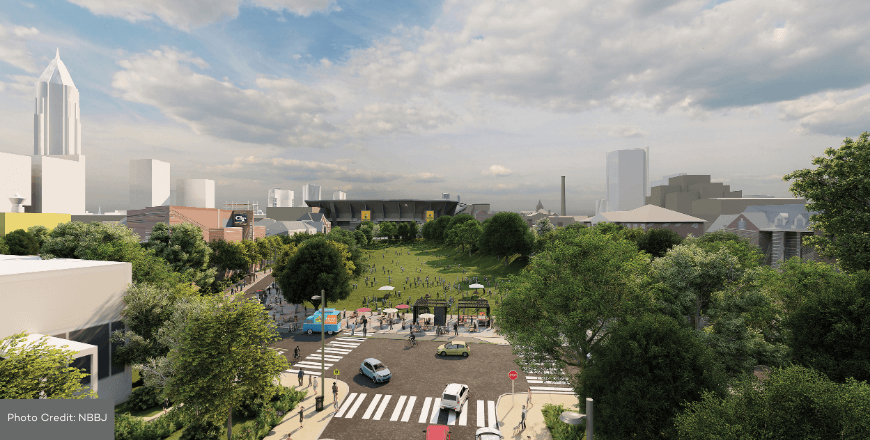- Integrated Planning
Integrated Planning
Integrated planning is a sustainable approach to planning that builds relationships, aligns the organization, and emphasizes preparedness for change.
- Topics
Topics
- Resources
Resources
Featured Formats
Popular Topics
- Events & Programs
Events & Programs
Upcoming Events
- Community
Community
The SCUP community opens a whole world of integrated planning resources, connections, and expertise.
- Integrated Planning
Integrated Planning
Integrated planning is a sustainable approach to planning that builds relationships, aligns the organization, and emphasizes preparedness for change.
- Topics
Topics
- Resources
Resources
Featured Formats
Popular Topics
- Events & Programs
Events & Programs
Upcoming Events
- Community
Community
The SCUP community opens a whole world of integrated planning resources, connections, and expertise.
Merit - Existing CampusGeorgia Institute of Technology
2023 Comprehensive Campus Plan Jury Comments“. . . I loved the strategic website the students could take part in and leave notes and ideas . . . perfect example of the smarts of a research university underpinning the big plan . . . I like its stewardship of resources and capital planning in response to a projected 26% growth in enrollment . . .”
Jury Comments“. . . I loved the strategic website the students could take part in and leave notes and ideas . . . perfect example of the smarts of a research university underpinning the big plan . . . I like its stewardship of resources and capital planning in response to a projected 26% growth in enrollment . . .”Highlights
- Site – 476.9 acres
- The plan builds on the institute’s legacy and success
of previous planning. - The project promotes stewardship of the land, the
environment, and the community - Parking is densified at the periphery in structures
serving as mobility hubs. - The project establishes a car-free core.
- The plan accommodates the 26% enrollment growth
without adding any net new parking.
Perspectives
The 2023 Comprehensive Campus Plan provides a framework for successfully executing the 2020 Institute Strategic Plan with a commitment to people, research, teaching, and the environment. The project’s purpose was
to conduct an inclusive and comprehensive planning process that builds on the legacy of the many past and
ongoing plans completed since the previous (2004) campus plan. The ultimate goal was to deliver a “living plan”
that will serve as a decision-making framework for stewardship of resources and capital planning in response to a
projected 26% growth in enrollment and evolving campus priorities over the next decade and beyond.Principles of innovation, discovery, and co-creation to uncover and implement the best outcomes in collaboration
with students, community, and internal institutional experts guided the planning process. The process reached out
to 80 external community organizations and hundreds of individual campus users through in-person and virtual
forums, campus-wide surveys (1000+ participants), and an interactive website.The plan drives priorities identified by the constituents: a student-first experience, community well-being,
ecological stewardship/resiliency, and a transformative campus. The plan promotes an active, well-connected
campus that encourages physical movement and discourages car dependency by prioritizing transit, pedestrian,
bike, and other modalities to provide universal and equitable access. Recommendations support accessible
mental and physical health resources coupled with spaces for contemplation, relaxation, and recreation. The plan
proposes a central location for services within an active green corridor near other student-oriented amenities.
Recommendations prioritize expanding performance landscapes, reducing stormwater runoff to pre-development
conditions, and increasing campus tree canopy and biomass areas.To ensure long-term relevancy, the plan delivered a first-of-its-kind “living plan,” a simple-to-use GIS-based
digital model of the campus and a tool that gives staff the ability to adjust planning scenarios and measure in
real time the impacts of the change. This novel approach facilitates informed decision-making, guides capital
investments, and is foundational to plan governance.The Georgia Institute of Technology 2023 Comprehensive Campus Plan delivers a flexible, living framework
focused on innovation and access to achieve the institute’s mission of developing leaders who advance
technology and improve the human conditionProject Team
NBBJ; Stantec, Mobility Planning; Sherwood Design Engineers, Stormwater and Ecology; Introba, Utilities Engineering; Brightspot Strategy, Space Planning; Planners for Environmental Quality (PEQ), External Community Engagement; Braislford & Dunlavey, Student Life Planning; Perez Planning and Design, Local Context Planning.
- Topics
- Topics


